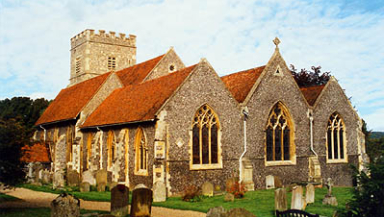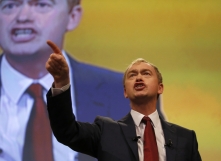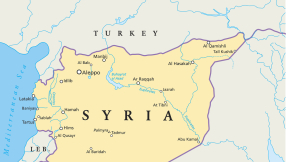St Andrew's Church in Sonning dates back to the 10<sup>th Century, its church tower, above its distinctive red roof, offering unrivalled views across Berkshire and Oxfordshire's rolling hills. Although it lies near the actor George Clooney's recently acquired £10 million mansion by the Thames, St Andrew's is made up of ordinary middle-England parishioners who are keenly loyal to the most famous member of their congregation.
The incoming prime minister, Theresa May has been attending every Sunday, when she can, since before becoming an MP in 1997. She tends not to stay behind for tea after the service, but there is no doubt about her commitment among fellow worshippers. Shirley Chard, a former PCC Secretary at the church, says May and her husband Philip "attend very regularly and are very supportive". Chard tells Christian Today: "Mrs May attends every Sunday that she possibly can, apart from when she's out of the country or on occasions such as Remembrance Sunday – we all understand about that. Both her and her husband are very good attenders. She attends socials and other events whenever she can. She has been very supportive of the new church hall that is being built. They attend all sorts of things throughout the village, such as the September local show."
Local parishioners are expecting May to attend the Sunday service next week as usual, despite her being appointed prime minister tomorrow in the aftermath of yet another wave of Westminster drama that has followed the Brexit vote last month.

So who is this un-flashy politician and quiet Christian, who is currently packing for the move from Berkshire to Downing Street? To what extent does her faith impact on her politics?
Born in 1956, May was the only child of Rev Hubert Brasier and his wife Zaidee. She was raised in rural Oxfordshire amid heavy demands on her vicar father. She attended a local grammar school and – having already been drawn to the Conservative party around the age of 12 – won a place to study Geography at Oxford. While she was there, she met her husband Philip at a student Tory disco. She has described him to friends as her rock.
Although May enjoyed a comfortable, classically middle class upbringing, she has experienced pain. In 1981, her father died in a car accident. The following year, her mother, who suffered with multiple sclerosis also died. After that, the Mays discovered that they could not have children. "It just didn't happen," she told The Daily Telegraph. "You look at families all the time, and you see there is something there that you don't have."
Having worked in financial services, May won the seat of Maidenhead during Tony Blair's landslide general election victory for Labour in 1997.
Although a traditionalist in style, Blair's 'modernising' politics were formative for May. Around 2001, she started attending private meetings at the fringe Tory leftist organisation the Tory Reform Group. And in 2002, as party chair under then leader Iain Duncan Smith, she surprised and angered some of her own party activists at their annual party conference. "Our base is too narrow, and so, occasionally, are our sympathies," she said. "You know what some people call us: the nasty party."
And here lies the contradiction at the heart of May's agenda: she is at once moral conservative and social liberal. This contrast has been evident during her time as Home Secretary since 2010. A steady hand at the notoriously turbulent Department, May was increasingly tough-talking on immigration. Yet she also did more than any other Home Secretary since Kenneth Clarke in attempting to reform the police, for years finding herself at loggerheads with the conservative Police Federation over police corruption and misuse of stop-and-search. Dismissed as authoritarian and "illiberal" by the evangelical Christian Lib Dem leader Tim Farron this week, she has nonetheless gained the support of Tory heavyweight civil libertarian David Davis MP.
On conscience issues, May has been on what is known in Westminster as a 'journey'. In 1998 she voted against lowering the age of consent and in 2002 against gay adoption, though she backed the introduction of civil partnerships in 2004. She has changed her mind over the years on gay adoption, and wrote in Pink News in June 2010 that there needs to be a "cultural change" in Britain to tackle homophobia.
In 2008, May voted for the abortion time limit to be lowered from 24 to 20 weeks in the abortion amendments to the Human Fertilisation and Embryology Bill (now Act), a position she is said privately at least to maintain.
This mixed picture has left some leading conservatives unconvinced. Peter Hitchens, the Mail on Sunday columnist and a practising Christian, calls her a "Blairite". And he tells Christian Today: "I see no sign that Theresa May supports socially conservative policies. This is the only way in which she resembles Margaret Thatcher, whose private religious and moral views appear to have been conservative, but who did nothing to restrain the morally and socially liberal agenda of her colleagues."
May does not "do God" in the sense of talking publicly on a regular basis about it. But in 2014 she told BBC Radio 4's Desert Island Discs that her faith does impact on her approach to issues, and chose two hymns for her songs including When I Survey The Wondrous Cross. But she added of faith: "It's right that we don't flaunt these things here in British politics."
Of her upbringing, May told the same programme: "Obviously everything did revolve very much around the Church. Early memories of a father who couldn't always be there when you wanted him to be, but he was around quite a lot of the time and other times when other parents weren't normally. I have one memory for example of being in the kitchen and looking up the path to the back door where a whole group, a family, that had come to complain about an issue in the church and that's it, just knock on the door and expected to see the vicar."
Quintessentially English and somewhat shy and reserved, May is "cold" according to some, but she is not incapable of expressing emotion. In April, some MPs wept and she herself looked close to tears as she made a statement on justice for the victims of the Hillsborough disaster of 1989.
May has impressed faith groups, including the Jewish community. The Jewish Chronicle said that, "As the longest-serving Home Secretary for more than a century, Mrs May is perhaps better placed than any other politician to understand British Jews' concerns on extremism and rising antisemitism" and the Israeli daily newspaper Haaretz has hailed her rise to Number Ten as "welcome news for the Jewish community".
The JC points out that after the attack on a Jewish supermarket in Paris last year May attended a Board of Deputies meeting and held a "Je Suis Juif" sign before pledging to "wipe out" antisemitism in the UK. It said she was "very warmly received as the guest speaker at the Community Security Trust's annual dinner" in March, and would be a "safe pair of hands and a continuity candidate in terms of communal relations".
On behalf of the Catholics, Cardinal Vincent Nichols, who has worked closely with May on human trafficking issues, wrote to her this morning to say: "I am personally delighted at your appointment. I know from the work we have done together that you have so many qualities to bring to the service of our countries at this time. I appreciate the maturity of judgement, the steely resolve, the sense of justice and the personal integrity and warmth you have always shown."
If Jews and Catholics are happy however, the Muslim reaction to her elevation may be more mixed. After facing criticism from Muslim groups over the new Counter Terrorism and Security Act and the controversial anti-radicalisation Prevent strategy, May was last year's "Islamophobe of the year" according to the Islamic Human Rights Commission. But earlier this year, May pleased some Muslims with the announcement of a review into use of controversial Sharia law.
Also controversial was May's refusal last year to accept a mandatory EU refugee quota system in response to the Mediterranean migrant boat crisis. May had originally refused to accept any refugees under the proposed EU resettlement programme. Yet she outraged campaigners – including some Christians – by also ruling out Britain taking part in any future EU system to relocate asylum seekers who successfully make the journey across the Mediterranean. "It is shameful that the British Government seems eager to opt out of doing the right thing by some of the world's most desperate people," said Anna Musgrave of the Refugee Council at the time.
And to this day, May is refusing to say that EU migrants will be allowed to stay in post-Brexit Britain.
But away from controversy and back in Sonning, there is at least as much good will for May as there is, for now at least, in the Conservative party. Those close to May know she faces her toughest challenge yet.
Rev Jamie Taylor, the vicar at St Andrew's and a friend of May, describes her as a "very supportive member" of the historic church and a "hard-working and respected MP". Taylor adds: "We pray weekly for Her Majesty and those set in authority under her, and that prayer will take on a little more significance for us at St. Andrew's in the years ahead...On behalf of all at St Andrew's Church...I warmly congratulate [May] as she prepares to take up the daunting responsibilities before her."














